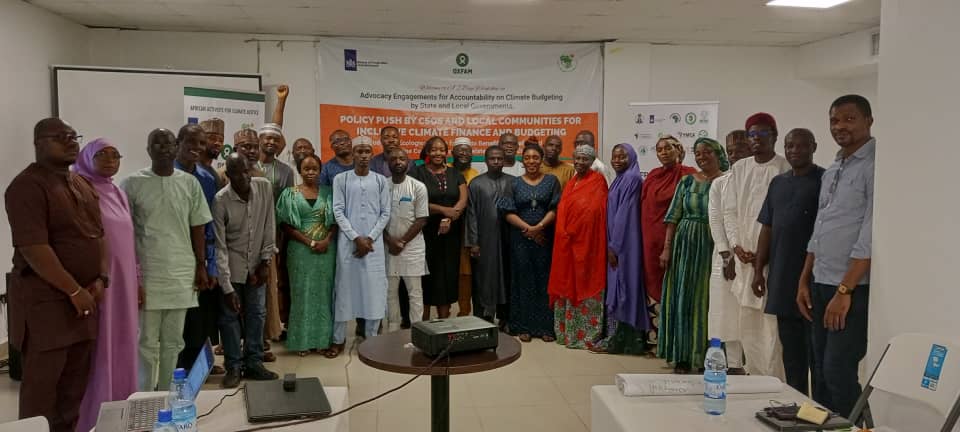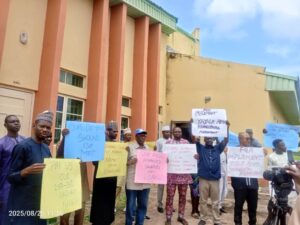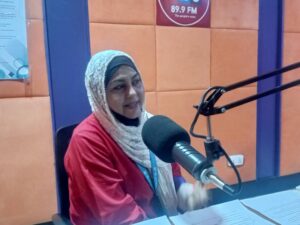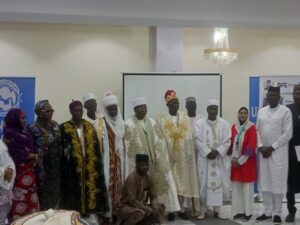
By Tasiu Hassan, Adamawa
To properly mitigate the impact of climate change, the Adamawa state government has been enjoined to ensure adequate release of funds meant for climate change and other environmental issues.
Equally, the state has been urged to encourage the participation of more youths, women, community leaders, and the media in the campaign for climate action/justice.
These were parts of the submissions made by participants at a training workshop on advocating for accountability on climate change budgeting for stakeholders in Adamawa state.
In a communique issued at the end of the workshop in Yola, the Adamawa state capital, the participants observed that plastic bottle and sachet water-producing companies are not living up to their responsibilities in addressing the environmental menace caused by them.
The two-day event, which was organized by OXFAM in collaboration with the African Activists for Climate Justice (AACJ) Project funded by the Government of the Netherlands, had in attendance participants from MDAs, Civil Society Organizations, and the Media in Adamawa state.
Read the full communique below;
COMMUNIQUE ISSUED AT THE END OF A TWO-DAY TRAINING WORKSHOP ON ADVOCATING FOR ACCOUNTABILITY ON CLIMATE CHANGE BUDGETING FOR STAKEHOLDERS IN ADAMAWA STATE.
PREAMBLE
The workshop held from Thursday 2nd to 3rd November 2023 at AUN Hotel Yola, Adamawa State, was put together by OXFAM for the African Activists for Climate Justice (AACJ) Project funded by the Government of the Netherlands. The two-day session, which focused on climate change and environmental issues in Adamawa State, was attended by over 40 participants drawn from MDAs, Academia, Civil Society Organizations (CSOs), and the Media.
The workshop was aimed at advocating for accountability on climate change budgeting in Adamawa state and at the Local Government level as well as inclusive climate finance. Participants were enlightened and informed on Climate change issues, how it affects the economy of the state, and how it can be quantified. They also developed participants’ skills in climate change, policies, governance, and financing for sustainable economic growth and development.
Adamawa state is an agrarian state depending on land and water and also has one of the largest livestock markets in Nigeria with over four million people. The state is located in the northeastern part of Nigeria. It lilie altitudes 7O and 11OE and between longitudes 11O and 14O E. The state occupies 36,9917 square kilometers of area. Bordered by the states of Borno to the northwest, Gombe to the west, and Taraba to the southwest.
Its eastern border forms the national eastern border with Cameroon. The state is characterized by dry-semi-arid conditions, low precipitation, and sparse vegetative. The state is faced with rapid desert encroachment from severe to moderate and marginal coupled with other environmental challenges as a result of global warming and climate change effects. This has led to low yield of crops, protracted farmers and herdsmen clashes for scarce resources, flooding, and other natural disasters. The contribution of Adamawa State to Green House Gas emissions is negligible while the projected impacts of global climate change in the State are devastating.
During the workshop, the following observations were made;
OBSERVATIONS
1. Currently, the Adamawa state Government has come up with some climate change response plans, including the ban on tree felling for charcoal production.
2. The state is also a beneficiary of a World Bank project – ACReSAL. The project focuses on tree planting and building community resilience in all the 21 LGAs of the state.
3. The Adamawa government is also one of the states that subscribed to Nigeria’s $500 million World Bank livestock development loan for the diversification of the agricultural value chain. The livestock development initiative called L-PRESS is also aimed at increasing productivity and reducing farmers-herders conflicts in the state.
4. It was observed that plastic bottle and sachet water-producing companies are not living up to their responsibilities in addressing the environmental menace caused by them.
5. Adamawa state doesn’t have any strategic action plan on climate change.
6. No proper coordination on climate change and environmental issues.
7. No sector working group that could push for funding and coordination from other UN agencies.
8. Inadequate awareness creation, sensitization, and education about climate change by Government and non-state actors leading to poor knowledge of climate and environmental issues among citizens of Adamawa state.
9. Inadequate release of funds budgeted for climate change and environmental sustainability.
10. The state is lagging regarding the NDC target of 2030.
11. There is no directorate of Climate Change in the Ministry of Environment.
12. The state government and the CSOs are not adequately accessing funds meant for climate change, due to a lack of information and capacity on how to access the funds from various MDAs at the federal government level and development partners.
13. It was observed that there is a shortage of manpower in the Ministry of Water Resources, particularly those responsible for the collection of hydrological data.
14. Inadequate commitment to construct dams and reservoirs to conserve water and runoff water during the rainy season.
15. Non-inclusion of climate change as a subject in school curriculum.
To address the above-mentioned challenges, the following recommendations were made;
RECOMMENDATIONS
Need for development of a 3-5 years robust strategic action plan on climate change.
There is a need for collaboration and synergy among all stakeholders in the sector.
The government should support and strengthen the activities of CSOs and pro Climate groups like the Coalition for Climate Change Action in the Northeast COCCAN, to effectively tackle climate change and other environmental problems.
Government and Non-state actors need to regularly sensitise people and create awareness on climate change and other environmental issues.
Adamawa state should take charge and effectively control mining activities.
There is a need for adequate political will on the part of the government on climate-related issues in the state, especially in areas of budgeting and legislation on climate change.
There is a need for the provision of briquette and solar facilities to support people following the ban on the use of charcoal.
The government should step up efforts towards achieving the NDC 2030 target through the provision of Gas powered Buses for mass transportation among others.
Inclusion of climate change in school curriculum, so as to improve students’ understanding of the issue.
Government and CSOs should intensify efforts in accessing Ecological Funds and other grants meant for mitigating the effects of climate change and other environmental issues.
There is a need to mainstream gender in the crusade against the impact of climate change as women and children are mostly affected by the disaster.
CSOs should improve their lobbying and influencing processes in order to achieve the desired result.
The government should employ staff that will collect hydrological data or employ the services of experienced retired gauge readers to do the task for proper planning and projections.
There is a need for the construction of more dams and reservoirs in the state to cater for off season and irrigation systems to support food security and absorb impact of flooding.
There is a need for continuous education/sensitization of the general public on early warning signals. It appears there is negligence and ignorance on the side of the communities in the State.
Also, state, local governments, and the entire members of the public should prioritize environmental/climate change issues as they affect the health and livelihood of the people in the state.
There is a need to encourage the participation of more youths, women community leaders, and the media in the campaigns for climate change action/justice.
Introduction and improvement of climate change proven smart agriculture.
There is a need to set up a climate change working group for Adamawa State.
Communiqué Drafting Committee
1. Dr Ibrahim Ahmed Umar- ED/CEO ADSEPA
2. Hajiya Safiya Mohammed Abubakar
3. Yohanna Moses
4. Aminu Mallum
5. Tasi’u Hassan
6. Emmanuel H Abana
7. Dr Stephen Jonathan
8. Mrs Edna Azura
9. Farida Adamu Hamma-Jalo


